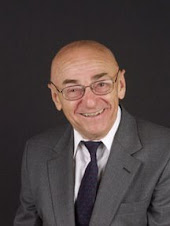"The most exciting thing in life is to try to enhance our understanding of the human condition. The job of a philosopher is to think out the premises and presuppositions of the culture around them; to try to understand and interpret the most fundamental issues around us during the time we live."
Born in Chicago, Compton earned his bachelor’s degree in mathematics from the College of Wooster and his master’s and doctorate in philosophy from Yale University. His father, Arthur Compton, won the Nobel Prize in physics for helping to develop the first self-sustaining atomic chain reaction, resulting in the controlled release of nuclear energy.
“After World War II and the explosion of my father’s ambiguous creation, the world – insofar as I would have any part in it – needed more reflection and more emphasis on the values for which we live..."I recall many happy holiday receptions in his home, many instructive hours in his classroom, and I recall with special fondness a moment in the Vanderbilt bookstore early in grad school, when he ambled over and exclaimed of the book I'd just picked up, "Willy James!"
His daughter was also a very good teacher, of my daughter, of High School French. That's the way of good teachers, to replicate and transmit ripples of good, down the generations.
He was quite right to tell me, at my PhD defense: "too many words!" Still trying to heed that wise counsel of conscience.
I agree with my old classmate & roomie who says JJC was the very epitome of what a college professor should be. And I agree with John Lachs, who says of his departed colleague: “He was a kind, elegant man and a very good philosopher.”
Takes one to know one.





 Charles Darwin (
Charles Darwin (










